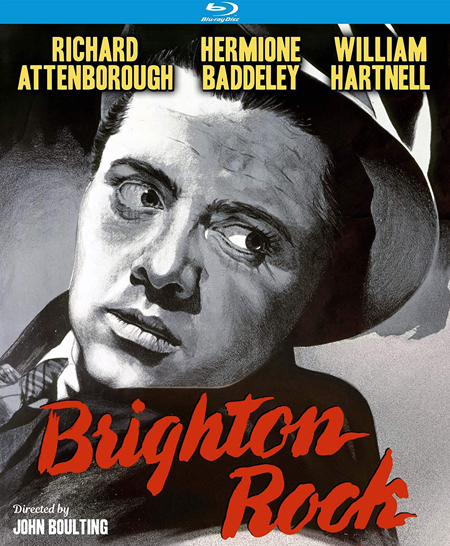
“PSYCHO
SCARFACEâ€
By
Raymond Benson
While
we in the United States think of the “gangster film†as something that is
perhaps distinctly American, it can be forgotten that other countries have had
their fair share of mobsters, too. The U.K. is a typical specimen. There have
been some very bad hombres in movies like Sexy Beast and The Long
Good Friday, which are classic examples of British gangster cinema.
It
was a pleasant surprise to discover Brighton Rock, obviously a beloved crime
movie in Britain, but not as well known in the States. In fact, the movie was
released in America as Young Scarface. This thriller, made in
1947 and released very early in 1948, is a product by the Boulting Brothers
(identical twins!), who were a sort of British Coen Brothers at the time. They
produced numerous quality movies from the late 1930s to the 1970s, usually
directing separately, or maybe one would produce while the other directed, and
so forth. In this case, Roy Boulting was the producer, and John Boulting was
the director.
The
screenplay for Brighton Rock was written by the acclaimed Graham Greene
and Terence Rattigan, based on Greene’s 1938 novel. The book had already been
adapted into a West End stage play prior to the Boulting Brothers’ further
turning it into celluloid.
A
very young Richard Attenborough made his acting breakthrough as the star of the
picture, playing a truly psychotic sociopath, Pinkie Brown, a role for which he
had received praise in the stage play. The character is only seventeen, but he
is a ruthless, cruel, cold killer who is handy with a knife—and he becomes the
leader of his gang after the boss is murdered.
As
the movie’s title crawl tells us, Brighton as a beach resort was a hotbed of
criminal activity between the world wars. The story takes place in the late
1930s, when rival gangs were vying for territory and commerce in the community.
Pinkie blames a journalist for the boss’s death because of an article the
writer penned about the rival gangs. Pinkie then stalks and kills the
journalist. Enter amateur sleuth Ida Arnold (Hermione Baddeley… wait, Hermione
Baddeley??), who is an entertainer on the Brighton pier. She is convinced
that Pinkie and his gang were responsible for the journalist’s death (she knew
him personally), but the local police don’t buy it and have closed the case.
Meanwhile, Pinkie meets an innocent and pretty waitress named Rose (Carol
Marsh). Pinkie woos her in his creepy, icy way, and astonishingly, this strict
Catholic girl with no street smarts falls in love with him (this is perhaps the
only element of the story which is a bit difficult to swallow).
Things
get more complicated as Pinkie sets out to destroy anyone who might have the
goods on him, and he also wants to strike at—or maybe join—the rival gang,
which is gaining more power in the territory.
Allegedly
Greene was not happy with the film’s ending, because the Boultings changed it
slightly from the novel. In truth, the filmmakers presented a more ironic,
albeit happier, conclusion to the story, which works very well. It can be
argued that the movie’s ending is actually more cynical than the book’s finale.
Brighton
Rock is
Attenborough’s movie. His performance is chilling; it’s a measured, quiet, intelligent
portrayal of a psychopath that gives Richard Widmark in Kiss of Death a
run for his money. Baddeley is also winning as the bubbly and stubborn
extrovert who insists on solving the crime when she has no reason to do so.
Kino
Lorber’s new high definition restoration (from StudioCanal) looks and sounds
terrific, and there is an accompanying audio commentary by film historian Tim
Lucas. There are no other supplements aside from the trailers for this and
other Kino Lorber releases.
Brighton
Rock is
recommended for fans of British cinema, gangster movies, and crazy criminals.
CLICK HERE TO ORDER FROM AMAZON
